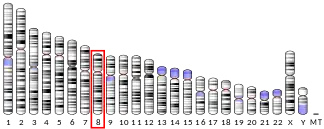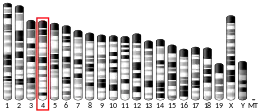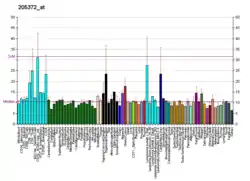PLAG1
Zinc finger protein PLAG1 is a protein that in humans is encoded by the PLAG1 gene.[5][6]
Function
Pleomorphic adenoma gene 1 encodes a zinc finger protein with 2 putative nuclear localization signals. PLAG1, which is developmentally regulated, has been shown to be consistently rearranged in pleomorphic adenomas of the salivary glands. PLAG1 is activated by the reciprocal chromosomal translocations involving 8q12 in a subset of salivary gland pleomorphic adenomas.[6]
Interactions
PLAG1 has been shown to interact with Karyopherin alpha 2.[7]
References
- GRCh38: Ensembl release 89: ENSG00000181690 - Ensembl, May 2017
- GRCm38: Ensembl release 89: ENSMUSG00000003282 - Ensembl, May 2017
- "Human PubMed Reference:". National Center for Biotechnology Information, U.S. National Library of Medicine.
- "Mouse PubMed Reference:". National Center for Biotechnology Information, U.S. National Library of Medicine.
- Kas K, Röijer E, Voz M, Meyen E, Stenman G, Van de Ven WJ (Nov 1997). "A 2-Mb YAC contig and physical map covering the chromosome 8q12 breakpoint cluster region in pleomorphic adenomas of the salivary glands". Genomics. 43 (3): 349–58. doi:10.1006/geno.1997.4819. PMID 9268638.
- "Entrez Gene: PLAG1 pleiomorphic adenoma gene 1".
- Braem CV, Kas K, Meyen E, Debiec-Rychter M, Van De Ven WJ, Voz ML (May 2002). "Identification of a karyopherin alpha 2 recognition site in PLAG1, which functions as a nuclear localization signal". J. Biol. Chem. 277 (22): 19673–8. doi:10.1074/jbc.M112112200. PMID 11882654.
Further reading
- Van Dyck F, Declercq J, Braem CV, Van de Ven WJ (2007). "PLAG1, the prototype of the PLAG gene family: versatility in tumour development (review)". Int. J. Oncol. 30 (4): 765–74. doi:10.3892/ijo.30.4.765. PMID 17332914.
- Kas K, Voz ML, Röijer E, Aström AK, Meyen E, Stenman G, Van de Ven WJ (1997). "Promoter swapping between the genes for a novel zinc finger protein and beta-catenin in pleiomorphic adenomas with t(3;8)(p21;q12) translocations". Nat. Genet. 15 (2): 170–4. doi:10.1038/ng0297-170. PMID 9020842. S2CID 21106779.
- Voz ML, Aström AK, Kas K, Mark J, Stenman G, Van de Ven WJ (1998). "The recurrent translocation t(5;8)(p13;q12) in pleomorphic adenomas results in upregulation of PLAG1 gene expression under control of the LIFR promoter". Oncogene. 16 (11): 1409–16. doi:10.1038/sj.onc.1201660. PMID 9525740.
- Kas K, Voz ML, Hensen K, Meyen E, Van de Ven WJ (1998). "Transcriptional activation capacity of the novel PLAG family of zinc finger proteins". J. Biol. Chem. 273 (36): 23026–32. doi:10.1074/jbc.273.36.23026. PMID 9722527.
- Aström AK, Voz ML, Kas K, Röijer E, Wedell B, Mandahl N, Van de Ven W, Mark J, Stenman G (1999). "Conserved mechanism of PLAG1 activation in salivary gland tumors with and without chromosome 8q12 abnormalities: identification of SII as a new fusion partner gene". Cancer Res. 59 (4): 918–23. PMID 10029085.
- Voz ML, Agten NS, Van de Ven WJ, Kas K (2000). "PLAG1, the main translocation target in pleomorphic adenoma of the salivary glands, is a positive regulator of IGF-II". Cancer Res. 60 (1): 106–13. PMID 10646861.
- Braem CV, Kas K, Meyen E, Debiec-Rychter M, Van De Ven WJ, Voz ML (2002). "Identification of a karyopherin alpha 2 recognition site in PLAG1, which functions as a nuclear localization signal". J. Biol. Chem. 277 (22): 19673–8. doi:10.1074/jbc.M112112200. PMID 11882654.
- Hensen K, Van Valckenborgh IC, Kas K, Van de Ven WJ, Voz ML (2002). "The tumorigenic diversity of the three PLAG family members is associated with different DNA binding capacities". Cancer Res. 62 (5): 1510–7. PMID 11888928.
- Enlund F, Nordkvist A, Sahlin P, Mark J, Stenman G (2002). "Expression of PLAG1 and HMGIC proteins and fusion transcripts in radiation-associated pleomorphic adenomas". Int. J. Oncol. 20 (4): 713–6. doi:10.3892/ijo.20.4.713. PMID 11894114.
- Zatkova A, Rouillard JM, Hartmann W, Lamb BJ, Kuick R, Eckart M, von Schweinitz D, Koch A, Fonatsch C, Pietsch T, Hanash SM, Wimmer K (2004). "Amplification and overexpression of the IGF2 regulator PLAG1 in hepatoblastoma". Genes Chromosomes Cancer. 39 (2): 126–37. doi:10.1002/gcc.10307. PMID 14695992. S2CID 12744571.
- Van Dyck F, Delvaux EL, Van de Ven WJ, Chavez MV (2004). "Repression of the Transactivating Capacity of the Oncoprotein PLAG1 by SUMOylation". J. Biol. Chem. 279 (34): 36121–31. doi:10.1074/jbc.M401753200. PMID 15208321.
- Colland F, Jacq X, Trouplin V, Mougin C, Groizeleau C, Hamburger A, Meil A, Wojcik J, Legrain P, Gauthier JM (2004). "Functional proteomics mapping of a human signaling pathway". Genome Res. 14 (7): 1324–32. doi:10.1101/gr.2334104. PMC 442148. PMID 15231748.
- Tsang YT, Chang YM, Lu X, Rao PH, Lau CC, Wong KK (2004). "Amplification of MGC2177, PLAG1, PSMC6P, and LYN in a malignant mixed tumor of salivary gland detected by cDNA microarray with tyramide signal amplification". Cancer Genet. Cytogenet. 152 (2): 124–8. doi:10.1016/j.cancergencyto.2003.12.001. PMID 15262430.
- Landrette SF, Kuo YH, Hensen K, Barjesteh van Waalwijk van Doorn-Khosrovani S, Perrat PN, Van de Ven WJ, Delwel R, Castilla LH (2005). "Plag1 and Plagl2 are oncogenes that induce acute myeloid leukemia in cooperation with Cbfb-MYH11". Blood. 105 (7): 2900–7. doi:10.1182/blood-2004-09-3630. PMID 15585652.
- Morerio C, Rapella A, Rosanda C, Tassano E, Gambini C, Romagnoli G, Panarello C (2005). "PLAG1-HAS2 fusion in lipoblastoma with masked 8q intrachromosomal rearrangement". Cancer Genet. Cytogenet. 156 (2): 183–4. doi:10.1016/j.cancergencyto.2004.04.017. PMID 15642402.
- Martins C, Fonseca I, Roque L, Pereira T, Ribeiro C, Bullerdiek J, Soares J (2005). "PLAG1 gene alterations in salivary gland pleomorphic adenoma and carcinoma ex-pleomorphic adenoma: a combined study using chromosome banding, in situ hybridization and immunocytochemistry". Mod. Pathol. 18 (8): 1048–55. doi:10.1038/modpathol.3800386. PMID 15920557.
- Declercq J, Van Dyck F, Braem CV, Van Valckenborgh IC, Voz M, Wassef M, Schoonjans L, Van Damme B, Fiette L, Van de Ven WJ (2005). "Salivary gland tumors in transgenic mice with targeted PLAG1 proto-oncogene overexpression". Cancer Res. 65 (11): 4544–53. doi:10.1158/0008-5472.CAN-04-4041. PMID 15930271.
- Zhao X, Ren W, Yang W, Wang Y, Kong H, Wang L, Yan L, Xu G, Fei J, Fu J, Zhang C, Wang Z (2006). "Wnt pathway is involved in pleomorphic adenomas induced by overexpression of PLAG1 in transgenic mice". Int. J. Cancer. 118 (3): 643–8. doi:10.1002/ijc.21400. PMID 16108035. S2CID 39276917.
External links
- PLAG1+protein,+human at the U.S. National Library of Medicine Medical Subject Headings (MeSH)
This article incorporates text from the United States National Library of Medicine, which is in the public domain.
This article is issued from Wikipedia. The text is licensed under Creative Commons - Attribution - Sharealike. Additional terms may apply for the media files.




